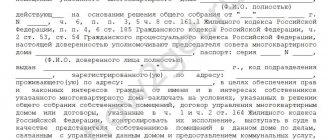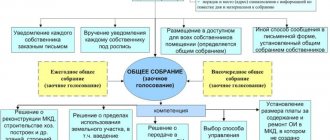HOA: what is it?
The definition of HOA is given in Article 135 of the RF Housing Code. This is a non-profit organization whose main purpose is to own, use and dispose, by force of law, of an apartment building. Members of the HOA are the owners of residential premises in the house.
This form of management is established at a general meeting of owners of residential premises by voting. Votes are distributed depending on the area of premises owned by the voter. The formation of a HOA is possible only with 50% or more of those voting for it. Each owner independently decides whether to join such an association or not.
The procedure for registering a non-profit organization is no different from registering a legal entity. The HOA has a current account in which residents' funds are accumulated.
Disadvantages of creating an HOA
The disadvantages of an HOA in an apartment building include:
- A complex procedure for registering a legal entity, consisting of several steps.
- Insufficient amount of equity capital to pay off emerging debts, which can provoke a conflict with contractors.
- The association is a non-profit structure, which does not allow registration of ownership of real estate.
- Responsibility of residents for decisions made of a financial nature: accounting, storage of documents, amount of membership fees.
- Lack of strict liability measures for debtors and other violators.
Below is a comparative table of the advantages and disadvantages of the chosen form of management.
| Pros of HOA | Cons of HOAs |
| First advantage: property owners, to save money, can carry out some types of work themselves. 2nd plus: the absence of a higher management body, which minimizes the corruption component. 3rd plus: higher real estate value with this form of management. 4th plus: minimizing costs and the possibility of debt to contractors by transferring money from a bank account. 5th plus: when concluding civil contracts, a legal entity can act as an intermediary. This will reduce costs and promote self-sufficiency. The association is given such powers by Article 152 of the housing legislation. | First disadvantage: if the activists include residential property owners who do not understand the problems at home well, then difficulties will arise in organizing work and making the right decisions. 2nd disadvantage: if the residents of an apartment building incur a debt for services provided, its amount must be distributed and paid by the remaining owners. Otherwise, the HOA will not be able to pay for the services of contractors. 3rd disadvantage: due to the fact that for some types of work the contractor’s services are used once, you cannot count on a discount. 4th minus: the presence of preferential categories of citizens and lost income. 5th minus: the inconstancy of legislative acts relating to the public utilities sector. 6th minus: utility tariffs cannot exceed the values determined by the tariff service. |
What are the goals of the HOA?
The main goal is to ensure that every homeowner has access to the management of their homes. The funds of a non-profit organization are formed from:
- mandatory contributions from residents;
- income received from business activities.
Housing legislation does not place obstacles for a partnership to receive income. It can rent out premises, carry out repairs and maintenance of a residential building, and also make a profit from the use of the local area. It is worth noting that transferring it into ownership of a non-profit organization is possible only with the consent of local authorities.
Pros of partnership
- Large degree of influence on the policy of a non-profit organization. All decisions are made by the HOA meeting. Every owner has the right to express their opinion.
- Opportunity to conduct business and reduce residents' expenses for maintaining the house. Members of the partnership have the right to rent out basements and non-residential premises for the purpose of making a profit. This money is a good reserve for homeowners for unforeseen expenses.
- The right to choose service providers and control their activities. The HOA can independently carry out all technical and operational work on the house. For those that it cannot afford, it can hire outside companies.
- Landscaping. Clean houses, playgrounds, lawns in the yard - perhaps this is exactly what distinguishes houses managed by an HOA. Real estate market experts state the fact that the cost of housing in HOAs is higher than the market price.
What are management companies and homeowners' associations
So, according to the Housing Code of the Russian Federation, a homeowners’ association is recognized as a type of real estate owner’s association, which is an association of owners of premises in an apartment building for the joint management of common property in an apartment building. When managing an apartment building by an HOA, the said partnership is responsible for the maintenance of common property in this building in accordance with the requirements of technical regulations, rules for the maintenance of common property in an apartment building, for the provision of utility services, the quality of which must meet the requirements of the rules established by the Government of the Russian Federation for the provision, suspension and restrictions on the provision of utility services to owners and users of premises in apartment buildings and residential buildings or for ensuring the readiness of engineering systems.
The general meeting of HOA members is the highest governing body of the partnership and is convened in the manner established by the charter of the partnership. The general meeting of HOA members is valid if it is attended by members of the partnership or their representatives holding more than 50% of the votes of the total number of votes of the members of the partnership. In Art. 145 of the Housing Code of the Russian Federation lists issues the resolution of which falls within the competence of the general meeting of HOA members.
When managing an apartment building by a management organization, it is responsible to the owners of the premises in the apartment building for the provision of all services and (or) performance of work that ensure the proper maintenance of the common property in this building and the quality of which must meet the requirements of technical regulations and maintenance rules established by the Government of the Russian Federation common property in an apartment building, for the provision of utility services depending on the level of improvement of the building, the quality of which must meet the requirements of the rules established by the Government of the Russian Federation for the provision, suspension and limitation of the provision of utility services to owners and users of premises in apartment buildings and residential buildings, or in cases , provided for in Art. 157.2 of this Code, for ensuring the readiness of engineering systems.
Cons of HOAs
- High costs for major repairs. As a rule, houses whose lifespan exceeds 30 years require significant investments. As long as the house is under the control of the management company (hereinafter referred to as the management company)? homeowners bear only the costs indicated in the receipt. The amount is too small, so it will take several years to completely renovate the building. There is no point in relying on government subsidies either, since our Government does not really delve into the problems of the housing stock. Thus, the pros and cons of an HOA in an old house are determined by the number of residents and their ability to pay. Experts believe that the formation of a partnership in the pulp of the old fund is an unbearable burden.
- Difficulties in registering a partnership. To apply for registration of an HOA, you must provide the Minutes of the meeting and expression of will of the residents of the house. The legitimacy of elections depends on the turnout of owners or tenants. They are considered legal if the number of people present exceeds 50%. To conduct elections, an initiative group must assemble.
- High building operating costs. It is worth noting that members of the partnership pay utility bills almost in the same amount as residents of other houses. Everything related to the improvement of a residential building is adopted at the General Meeting. This is where there is most disagreement.
- Legislative barriers. Unfortunately, HOA members may encounter difficulties when interacting with authorities. The period for applying to court to collect debt from a defaulter is the same as for other legal entities. The partnership must cover all of these utility bills from reserve funds.
- Problems also arise with beneficiaries, to whom the state provides bonuses when paying utility bills. In fact, the partnership must reimburse the difference between the accrued and paid payments, and the state must return them to it. In practice, this process does not always work.
- Lack of professionalism. It is not always the case that the house is inhabited by literate people who know how to manage housing. Often the reins of management end up in the hands of people who have no idea about income generation schemes, etc. In this case, a “staff shortage” occurs. It is possible to attract outside specialists, but such services will only become an additional expense item for a non-profit organization.
Pros and cons of the HOA and the management company: which is more profitable for residents
More than 80% of the housing stock in the Russian Federation is serviced by management companies. Such a high figure is not accidental: there is no clear legislation regulating the activities of partnerships.
Significant arguments in favor of the Criminal Code include:
- resolving most issues without the participation of apartment owners. Cleaning of the territory and entrances, garbage removal is carried out in a timely manner;
- maintenance work is carried out even in the presence of persistent defaulters. Due to limited resources, the HOA may temporarily stop carrying out operational work.
The main arguments against the Criminal Code boil down to the following:
- Lack of transparency of activities. Residents of the house are not aware of the volume of funds received and the items of their expenditure. Although Law No. 731 is now in force, on the basis of which apartment owners are required to be familiar with the budget of their home. Such information should be contained on the notice board. In practice, the Federal Law rarely works.
- Independent selection of contractors. In most cases, the management company formalizes relationships with organizations that charge less for their work, which affects their quality.
- Large staff. The costs of maintaining the administrative apparatus are several times higher than the costs of the HOA.
- The main goal is profit. The management company operates on a commercial basis. To earn more income, she saves on contractors, home renovations, etc. This is reflected in the improvement of the sponsored house and the mood of the residents.
Thus, having considered the pros and cons of HOAs and management companies, we can come to the conclusion: a partnership is a promising way of running a business, but subject to amendments to the legislation. It is not yet known when the amended bill on HOAs will be adopted. Today, most owners give their vote to management companies, as this means stability and a complete lack of worries. They pay the receipts and don't think about anything else.
What to do?
Each HOA is unable to fight the Federal Tax Service and complain to the court, so some of them agreed with the arguments of the Ministry of Finance and the Federal Tax Service and entered into agency agreements or pay the minimum tax. But it is possible, while remaining within the framework of the law on a non-profit organization, to reduce the risks of clashes with tax inspectors by other methods, namely, transferring the provision of services to third parties .
To do this, just read my previous article about how to still be profitable as an entrepreneur. If the Federal Tax Service finds fault with the expenses incurred by the HOA and says that they relate to entrepreneurial activity, then it will be easier and cheaper to transfer the execution of these works to individual entrepreneurs under a service agreement (mowing the lawn, home repairs, cleaning the territory, etc. .).
In this case: residents form a plan for spending on utility services, and the HOA draws up contracts with organizations that provide these services and in all cases acts as an intermediary. In this situation, the building manager is the financial manager of the HOA; he forms a plan for expenses and income with residents and enters into contracts based on this estimate. Those. residents pay to the HOA only for house management services, and the HOA itself is engaged in administration. It will be difficult to prove in this situation (based on the logic of court decisions) that the contributions are not targeted. The tax service may wonder why the minimum management tax is not paid, but even in this case the amount of fines and penalties will be too insignificant for the tax authorities to waste time collecting.
Thus, if we do not want large bills for house maintenance, then we need to do it ourselves, or at least participate: organize an HOA and participate in the management of the house: accept the income and expenditure part, check the use of funds, etc.
Homeowners' associations and housing cooperatives - comparative analysis
A housing construction cooperative (hereinafter referred to as housing cooperative) is individuals and legal entities united for common purposes - providing citizens with apartments and managing the property of sponsored houses. Today, more than 23% of new buildings are sold through housing cooperatives.
The essence of the housing cooperative comes down to citizens joining the cooperative and paying them a share, which is equal to the cost of future housing. The main difference between such an organization and an HOA is the rule for determining votes during elections. In the case of a housing cooperative, a decision is made only with the unanimous consent of all voters; for an HOA, 50% + 1 vote is sufficient.
Advantages of housing cooperatives:
- Temporary residence of unauthorized persons is possible only with the permission of all members of the cooperative. If someone is absent at the time the decision is made, then written notification is sent to him. This allows you to avoid social tension, violation of the rules of living in an apartment building and prevents illegal income-generating schemes.
- Availability of an audit commission. She is elected for a term of one year. Its main goal is to analyze the financial and economic activities of housing cooperatives.
- Income distribution. All profits received from the operation of the property of the house are distributed among the members of the cooperative.
- The number of cooperative members must be at least five.
Disadvantages of housing cooperatives:
- The right of ownership arises after payment of the share. Until then, alienation of the property is practically impossible.
- Expenses for maintaining the audit commission.
After paying the shares, residents can take ownership and reorganize into a HOA.
Thus, the main differences between the forms of housekeeping are:
- by the time of formation. A housing cooperative is formed before the construction of a real estate object as a common “wallet” for accumulating funds, and a partnership arises only after the delivery of the object;
- to the purpose of existence. The HOA sets the main task of effective management of common property, the housing cooperative - only the construction of the facility;
- to the number of members. In a housing cooperative there cannot be less than five of them, and in a partnership - less than 50% of all owners of apartments in the building.
So, the pros and cons of HOAs and housing cooperatives give an idea of each method of farming. Which one to choose is up to the tenant to decide. As for the experts, they consider housing cooperatives only as a transitional form to a partnership.
Advantages
First, let's clarify - what is an HOA?
This is a non-profit organization created to manage a particular home.
It consists of the owners of square meters related to a given house.
In general, this is a legal entity with all the attendant rights and obligations. And like any legal entity, it can make profit .
So, what are the advantages of this method of management:
- business is allowed;
- all issues are decided at the meeting of owners;
- Any home owner can speak out and his opinion is guaranteed to be taken into account;
- residents can choose their own contractors;
- there is an opportunity to organize the work on your own;
- transparency of activities - any citizen, even not living in this house, can request the necessary information about activities and his request will be satisfied.
Find out from our articles about how absentee voting of owners is carried out, what membership, insurance and other fees should be used for, as well as what the procedure for adopting the charter of an HOA is.
Thus, it turns out that if there is such an organization, you don’t have to worry about the cleanliness of the lawns, the availability of playgrounds, or parking lots. All this will happen because it is aimed at the benefit of the apartment owners of this building.
Realtors have long noted a peculiarity - square meters in those houses where a homeowners' association rules are always more expensive.
Pros and cons of methods of managing an apartment building: comparison table.
Read about issues of reorganization, liquidation and bankruptcy of a partnership on our website.








